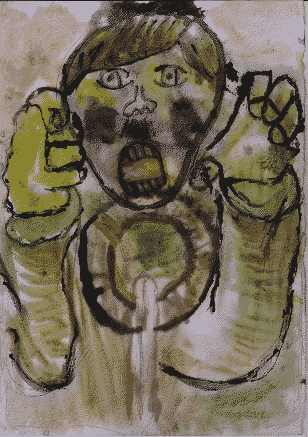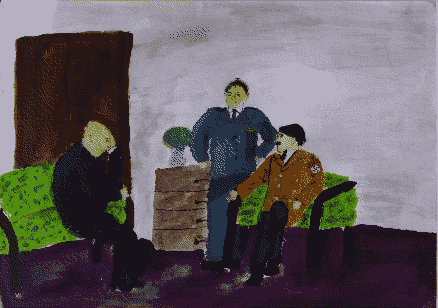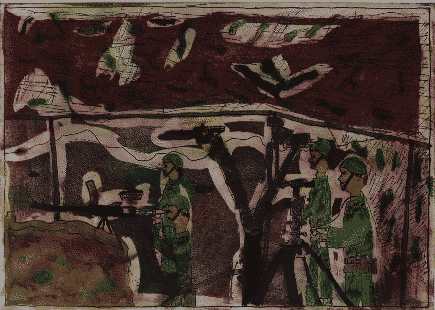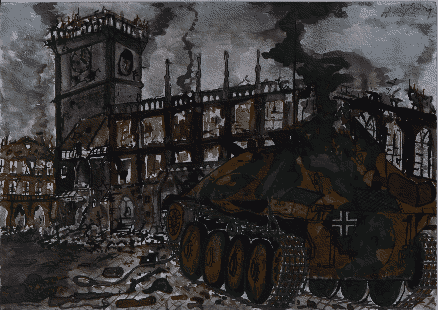Radio Prague's History Online Virtual
Exhibit!
RP's Home
* Top of Section
* Previous Page * Next Page
Long Text - Page 10 of 15
World War II
 After six months of the "Second Republic" -
as the old Czechoslovakia, minus its border regions, was known -
Bohemia and Moravia were occupied by the Nazis. Slovakia had ceded
from Czechoslovakia the day before - on March 14, 1939 - to form an
"independent" Nazi state, and thus
very short work indeed was made of the former Czechoslovakia.
After six months of the "Second Republic" -
as the old Czechoslovakia, minus its border regions, was known -
Bohemia and Moravia were occupied by the Nazis. Slovakia had ceded
from Czechoslovakia the day before - on March 14, 1939 - to form an
"independent" Nazi state, and thus
very short work indeed was made of the former Czechoslovakia.
Overnight, everyone had to start driving on the right side of the
road (they had previously driven on the left, as the British still
do).
The Czechoslovak President, Edvard Benes, and other government
politicians had already fled abroad - mostly to France and to
Britain. (Those that were in France went to Britain when France was
occupied). These leaders'
political campaign to represent Czechoslovakia's interests was an
uphill battle at first, as western European powers still favored the
policy of appeasement at that time.

By July 1940, however, Britain
recognized President Benes as the leader of the provisional "free
Czechoslovak government in exile." In addition to the London center
of the provisional government, the Moscow Communist center - where
politicians who favored the Soviet political system had fled - also
played an important role in the Czechoslovak resistance movement
during the war. Unfortunately, many of the Czechs and Slovaks who
had chosen to go to Moscow spent at least part of the war years in
Russian Gulags as suspected spies. Czechoslovak pilots in
England's RAF were particularly distinguished fighters (even if they
were initially segregated from regular troops for the same reason)
and they would play a fundamental role in the Battle of Britain -
but we are getting ahead of ourselves yet again. Czechoslovak army
units were also formed in France and in North Africa.
On October 28, 1939 - which would have been
the 21st anniversary of the Czechoslovak Declaration of Independence
had Czechoslovakia not ceased to exist - popular celebrations turned
into massive demonstrations of protest against the German
occupation. A young medical student, Jan Opletal, was fatally
wounded in the incident. His funeral, on November 17, 1939 turned
into yet another spontaneous demonstration. (Fifty years later, on
November 17, 1989, a march by students
to commemorate this event
 helped bring about the fall of Communism). In 1939, the Nazis
reacted to the student demonstration by sentencing nine student
leaders to death, by closing the Czech universities, and by sending
some 1,200 university students to concentration and labor camps.
helped bring about the fall of Communism). In 1939, the Nazis
reacted to the student demonstration by sentencing nine student
leaders to death, by closing the Czech universities, and by sending
some 1,200 university students to concentration and labor camps.
The Nazi regime was very cruel and strict, and active resistance was
harshly punished. Not surprisingly, then, the Czech and Slovak
resistance movements were small. Yet they were very dedicated, very
determined, and often surprisingly successful, especially in the
field of sabotage.
During the war, Czechoslovak army units fighting abroad often
parachuted foreign-trained Czech and Slovak soldiers into occupied
Czech territory to perform special assignments. The most significant
of these special assignments was the assassination, in 1942, of
Reinhard Heidrich - the German
Reichsprotektor of Bohemia and
Moravia and one of the architects of the "Final Solution."
His assassination by two Czechoslovak parachutists on May 27, 1942
set off a reign of terror throughout the Czech lands.
Martial law was declared and the Nazis conducted house-to-house
searches looking for the parachutists and the members of the Czech
resistance movement who had helped them. More than 1,600 people were
executed and more were sent to concentration camps in the period
immediately following the assassination.
 The terror reached its
height with the annihilation of the village of Lidice, where 339 men
were executed and the women and children of the village were sent to
concentration camps. A few weeks later, the village of Lezaky, where
the Nazis killed 54 men, women and children, was also razed to the
ground. By the time this terror - known as the "Heydrichiada" - was
over, the Nazis had damaged the resistance movement so much that it
was only able to resume its activities at the very end of the war.
The terror reached its
height with the annihilation of the village of Lidice, where 339 men
were executed and the women and children of the village were sent to
concentration camps. A few weeks later, the village of Lezaky, where
the Nazis killed 54 men, women and children, was also razed to the
ground. By the time this terror - known as the "Heydrichiada" - was
over, the Nazis had damaged the resistance movement so much that it
was only able to resume its activities at the very end of the war.
The resistance movements in Czechoslovakia culminated in the Slovak
National Uprising of 1944 - which was brutally put down - and in the
Prague Uprising in the Czech lands in May of 1945 - which started
just a few days before foreign armies arrived to officially liberate
the city.
RP's Home * Top of
Section
* Previous Page * Next Page

Document URL:
http://www.radio.cz/history/
Contact info:
Radio Prague, Vinohradska 12, 12099 Prague 2, Czech
Republic
tel (+420 2) 240 94 608 * fax (+420 2) 242 182 39
URLs http://www.radio.cz/
cr@radio.cz
© Copyright 1997 Radio Prague All
Rights Reserved
<.CENTER>
 After six months of the "Second Republic" -
as the old Czechoslovakia, minus its border regions, was known -
Bohemia and Moravia were occupied by the Nazis. Slovakia had ceded
from Czechoslovakia the day before - on March 14, 1939 - to form an
"independent" Nazi state, and thus
very short work indeed was made of the former Czechoslovakia.
After six months of the "Second Republic" -
as the old Czechoslovakia, minus its border regions, was known -
Bohemia and Moravia were occupied by the Nazis. Slovakia had ceded
from Czechoslovakia the day before - on March 14, 1939 - to form an
"independent" Nazi state, and thus
very short work indeed was made of the former Czechoslovakia.

 helped bring about the fall of Communism). In 1939, the Nazis
reacted to the student demonstration by sentencing nine student
leaders to death, by closing the Czech universities, and by sending
some 1,200 university students to concentration and labor camps.
helped bring about the fall of Communism). In 1939, the Nazis
reacted to the student demonstration by sentencing nine student
leaders to death, by closing the Czech universities, and by sending
some 1,200 university students to concentration and labor camps.
 The terror reached its
height with the annihilation of the village of Lidice, where 339 men
were executed and the women and children of the village were sent to
concentration camps. A few weeks later, the village of Lezaky, where
the Nazis killed 54 men, women and children, was also razed to the
ground. By the time this terror - known as the "Heydrichiada" - was
over, the Nazis had damaged the resistance movement so much that it
was only able to resume its activities at the very end of the war.
The terror reached its
height with the annihilation of the village of Lidice, where 339 men
were executed and the women and children of the village were sent to
concentration camps. A few weeks later, the village of Lezaky, where
the Nazis killed 54 men, women and children, was also razed to the
ground. By the time this terror - known as the "Heydrichiada" - was
over, the Nazis had damaged the resistance movement so much that it
was only able to resume its activities at the very end of the war.